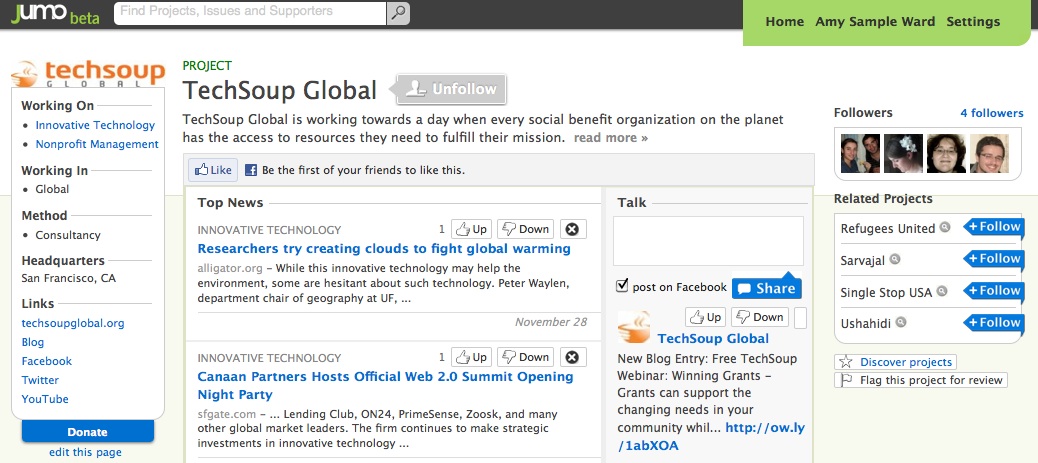After a week in the nonprofit world Jumo is making waves for its big push around nonprofit discovery via social networking. Is it working? We’ve sampled blogs from TechSoup community leaders in this post to help you determine whether investing time on JUMO is right for your organization.

Amy Sample Ward
As you may have heard, Jumo is now open in beta. What is Jumo? As Mashable reports, “Jumo was designed to let users find, follow and support the causes important to them, and with 3,500 organizations on board at launch, would-be philanthropists should be able to find and follow something of interest upon joining. (For comparison’s sake — Apple’s Ping had 2,000 artists two months out of the gate.)”
Functionality: Persistence
So far, trying to navigate the site to browse or set up a profile has about a 50/50 chance of hitting either a 504 or 500 error page. It’s been quite a frustrating process, especially when inputting 33 different countries one by one in the “where we work” section just to have the “save” not work. It is in beta, let’s not forget! So, patience and persistence are the keys to success. I’m always the first to admit I’m not patient, but I persistence this morning has gotten me pretty deep into the site – so keep refreshing your browser and you’ll get through!
Facebook Requirements
It seems that you have to have an organizational presence on facebook in order for the project page on Jumo to work/look right – I put in my facebook ID, thinking it was verifying my association as the admin on the organizational account, but instead it put my photo and info as the organization’s! I’m not sure that organizations will want to maintain, or create, a profile on facebook just as a ticket to using Jumo. Is this experience correct – have others found this to be true?
Transparency
Here’s the screen shot for the TechSoup Global page on Jumo. I am following the organization and am an administrator on the page – doesn’t appear to show either of those facts!

I’m also not finding any way to customize the URL so that users could more easily find, and I could more easily share/promote the page.
Messaging
I’ve had quite a string of issues with the messaging in Jumo. Here are some of the posts I’ve shared this morning with members of a social media for nonprofits group in facebook:
* when I try posting on people’s pages, it doesn’t appear to go through, but then they say they get 4 emails telling them about it (this is what one contact reported after I posted on his wall);
* when I tried posting an update on my own page it went through twice! Just checked back and Jumo deleted the second/double post but the diction is very strange! “Amy Sample Ward wrote on her/her profile:”
* I just posted on Beth’s wall on jumo and left the “post to facebook” box checked to see if it would post on her or my facebook wall as well, but it doesn’t seem to have done so.
* Also interesting, that it let me post on Beth’s wall (if the Jumo terms use “wall”) even though we weren’t following each other. Could mean that users don’t have a way to manage the amount of posts (read: spam) that could get through to them…
* I got an error that said only letters, spaces and punctuation were allowed… no numbers?!
The reason a site for finding and following causes you care about has social features is because it isn’t just the organizations we care about that we like to follow, but also the people we care about. If a friend or family member donates to an organization, starts or shepherds a campaign, or shares an appeal for support, data has shown that we are more likely to listen and even take action – we trust our friends and family and listen to what they say more than just ads or mass-messages. So, finding and following the people we want to listen to should certainly be easier in Jumo!
Purpose
As Tom Watson posted in a facebook group this morning, what’s the point?….does the nuance between the two platforms come down to “action” or something else? Organizations that I am or could follow are on both platforms, so what is the deciding factor influencing their strategy for engagement on the platform and the deciding factor for which platform I use to connect with them?
Beyond a Platform
Beyond this platform or that one, why do you, as an individual who is passionate about a cause, want to connect directly with a nonprofit organization online? Is it to take action – online? or off? Is it to know what they are doing and how they use the funds you may have given them? Is it to see if they are worth your donations or volunteer hours? How does your purpose for engagement influence your choice of platform?
Daniel Ben-Horin
When I first heard about Jumo quite a few months ago, I reacted basically as Tom Watson did, though more snarkily. Subsquently, a mutual friend brokered a call between Chris and me. He’s obviously a smart guy and he’s trying to do good in the world. I think it’s important that we in the nonprofit tech space stay open to new ideas, projects, people in our space, and don’t hold it against the the newbies that they are able to raise money easily or maybe haven’t paid what we might consider the appropriate dues. There’s no growth if we try to pull up the drawbridge behind us. That said, my feeling talking to Chris was that he was kind of checking off a box. I sensed he had received blowback for not having talked to enough NPO folks and was remedying that, but was very much in love with his concept, and wasn’t really open to revisiting his paradigm. He was going to do what he was going to do and our call felt very pro forma. I wouldn’t say that Ami, Greg or Ben of Idealist V’match and Change.org missed a whole lot, though of course if he was going to reach out to the field, Chris should have reached out to the orgs that are most active in the corner he wishes to inhabit.
But I think we should take a long view here. It is not foreordained that Jumo will ‘sweep away the competition.’ This is a different environment than the more or less purely social one of FB. With all his dough and pedigree, Chris and his team will still have to earn trust in order to succeed, and it’s not clear to me how well they understand that or how they expect to address that need. Frankly, Chris’s round of interviews notwithstanding, I think they have a *huge* learning curve about the npo sector and the ngo sector and civil society generally. Basically, I think the right approach is the one Amy is taking here–Try to understand what they are offering…withhold judgment as much as possible…openmindedly try to make Jumo ‘work’ for our organizations and causes….learn by doing so and hope they learn too. While it is frustrating to have tech glitches, let s/he among us who is without sin in that regard cast the first stone! I don’t see much point in castigating them for being pre-alpha rather than Beta. In general, the proof is in the benefits they provide for social change and I think that our community’s reaction should be focused on that, which will take some time to reveal itself.
The Jumo project reminds me a bit of when AOL Foundation set up Helping.org in late 90’s. I had funders tell me they wouldn’t support TechSoup because Goliath was clearly going to win this one. Didn’t happen that way after all, and I attribute the results to the much closer relationship we had to actual on the ground nonprofits. Idealist, V’match, Change.org (and I’d certainly add Wiser Earth to this list) have built up really committed followings. Jumo has a long way to go to get there.
On the other hand, none of us has built Facebook and we all talk about scale, reaching more people, getting beyond the circle of hard core activists etc. It’s conceivable that Chris and Jumo have something to teach us there. I’d like to find out.
Evonne Heyning
Five years ago we would muse with catalysts at the Omidyar Network about relationship networks, reputation and trust and the essentials of building strong communities of change for both local and global impact. Today some of those ideas have come to fruition with platforms like Change.org, Wiser Earth, Ushahidi, Quora, LinkedIn and Twitter campaigns. As many of us have worked together and cross paths frequently in the ethers there’s been a desire to track those engagements and understand true reputation through our work over time, mapping the most prolific leaders with great questions & endeavors like we do on the TechSoup Forums.
Jumo released to the public in the last 24 hours and has the potential to fill the gap between great people and great endeavors in a different way than Change.org, LinkedIn or Wiser Earth manages to do. Unfortunately it seems Jumo may have more interest in the transactional economy of giving than the relationship economy it has the potential to grow, becoming a philanthropic passthrough that takes a cut higher than most fiscal sponsors, but lower than the United Way. So far it functions very closely to the Causes function on Facebook, more like Razoo. It’s a start, but personally I want a real economy of contribution that goes deeper than dollars.
Tracking followers simply in the Quora fashion is a nice and elegant way to see who influences who but it lacks any sort of qualification or indication of endorsement. Recommendations in LinkedIn are more helpful but a star/point system would allow for users to vote up their favorite leaders and catalysts in various fields.
I value social action networks with indicators to vote up submissions to the creative economy. If you imagine each post, video or photo as an asset in the marketplace of Facebook or Twitter I want the ability to be able to give extra stars, points or fiery dragons to the people who are submitting the best possible solutions. The LIKE button is ok but I’d rather have 30 stars a day and have the ability to blow 5 stars on the best link or photo. I believe that this mix of a creative economy and reputation-associated relationship building will allow us to find collaborators and get things done more effectively in less time.
So far the social action networks that have sprung up to get things done quickly include Ushahidi, the Crisis Camps/Crisis Commons movements and Twitter social campaigns. Most of these have required the frequent use of googledocs and wikis to manage collaborative information across wide virtual teams and lack the ability to track the backend of engagement well as we look to reward those who are getting the most done.
Any tool that helps us leverage more for less is helpful….for now the tools that are helping me the most to create social change ripples include Twitter, Quora, YouTube, LinkedIn and Facebook. For now the social action networks like Change.org and Jumo offer enough for me to chime in once or twice, but I’m not seeing enough sticky reasons to keep coming back to share new endeavors. Is there a future for a philanthropic discovery site like Jumo that does not push regular emails or curated updates? Would you keep going back, or are you having better experiences with other social action networks?
Allyson Kapin
Are niche social networks the best way to mobilize people and channel their energy into supporting nonprofits? Will it turn more people into repeat donors and committed activists?
…. While Jumo has some cool Facebook integration, Twitter-like features and uses an algorithm to suggest projects and issues, many nonprofit campaigners say it needs to do much more to make it a valuable online social community that will lead to a deeper engagement.
“Jumo needs to question what makes them different, does the cause marketplace really need them, who will use the platform, and how will it be marketed to them,” said Geoff Livingston.
“I don’t see Jumo, at least right now, filling a gap,” said Amy Sample Ward of TechSoup Global. “I’d love to see a platform that is focused on action: finding actionable opportunities (Social Actions made great impact here), taking action (helping people find others to do it with them, build trust, form a community, etc.), and then report/display the results of the actions.”
……Hughes is a smart entrepreneur. Hopefully, he will listen to the nonprofit community’s feedback and adapt Jumo to connect people to nonprofits that truly move people up the ladder of engagement.
Jessica Dally
My biggest thought on Jumo has to do with why I use other social sites and that comes down to getting information out to people who aren’t working in the NPO sector. Certainly meeting, discussing and connecting with other NPO’s is TERRIBLY important but for much of my work in the past and currently, getting information out to people who are not in the field is equally important and this is where I wonder about time spent in Jumo. Sure, there’s a lot of NPO’s there for obvious reasons, but I have yet to find anyone there who isn’t also on FB or twitter. Every new tool creates more work and with smaller orgs with little ability to really hit every tool I can’t help but think that this is not a good use of time that could be spent reaching out to their community on Facebook or Twitter.
All this said, it’s way too soon to know if it’s great or not but likely I wouldn’t want to invest a ton of time there until I see it grow into something far better than it is now. Something more stable and with a better vision.
Evonne’s Summary:
Jumo is VERY beta and they’re catching up with tech bugs. They’re smart but not always asking the right questions when it comes to filling gaps in engagement or action for nonprofits. Jumo is focused on FIND FOLLOW SUPPORT: a discovery space for giving to new organizations. Volunteerism beyond posting a note to friends is nonexistant in this space and money is the only currency that counts.
Jumo’s topical navigation will serve smaller nonprofits well who jump on early, carve a niche and build a big fan base: however at this early stage it’s hard to tell if the total fundraising capacity will be any stronger than Causes on Facebook. Thankfully it requires little maintenance and should not be a big time drain for your social media leaders.
Written by: InKenzo

